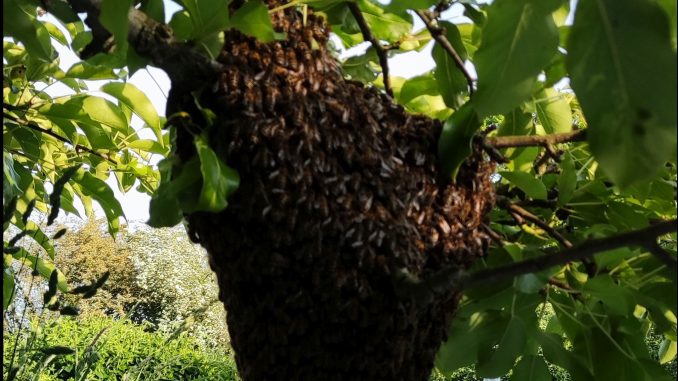
We are now half way through the active beekeeping season. Looking at the state of colonies as they came out of winter it was hard to see how they could build up in time for the OSR crop. But bees are amazing at expanding rapidly in spring if they have enough forage, even in this spring which has not been kind to bees.
Swarming is in full swing judging by my bees and the number of swarm calls I have received. This year we have tried to carry out pre-emptive artificial swarms on colonies to save time on subsequent inspections. The process was to find the queen and place her in an empty brood box on the original site and add a couple of frames of sealed brood. This brood is important as it provides plenty of nurse bees for the queen when they emerge. Frames of foundation were then added to make up the required number of frames plus some drawn comb if available. The box containing the brood was moved to one side and given a floor, roof and frames of foundation. This box will make emergency queen cells and, at the next inspection 7 days later, one sealed queen cell is left after knocking down all the others. It will be at least a month after the initial process was carried out before the new queen comes into lay but it may be necessary to provide a super to the hive to cater for the emerging brood (and honey hopefully).
Another way of slowing a colony down is to take a few frames of brood and place them into a nuc. Nucs are so important and we all should over winter some, preferably in polynucs. Winter losses for last year were high and quite a few people sadly lost all their bees. Nucs build up really well if transferred into a full box in early spring. We placed several nucs on OSR and they have produced a good crop, not far behind that overwintered full colonies. These nucs will also make emergency queen cells and again, inspect after a week and leave one good looking queen cell. Leaving many can allow a swarm to emerge from the artificial swarm or nuc. For nucs I prefer to move them to another apiary to avoid losing too many flying bees back to the parent colony. For a conventional artificial swarm this is less of worry as nearly all the bees in the box containing the brood remain there after the splitting.
There is far less OSR grown these days because of the neonic ban. However, if you had bees near a crop of rape it is important to extract soon as it will start to granulate quickly. So tomorrow the extractor will be in use for the first time this year. Hopefully it will spin easily and empty buckets can start to fill up.
The Association has extractors available to borrow but remember many people will want to extract around this time so best to put your name down if you want to make use of one. See the Yearbook for members who look after extractors.
Sometimes there is a shortage of nectar in June so do check your bees have enough stores to tie them over to summer flow.
Regards
Wally
